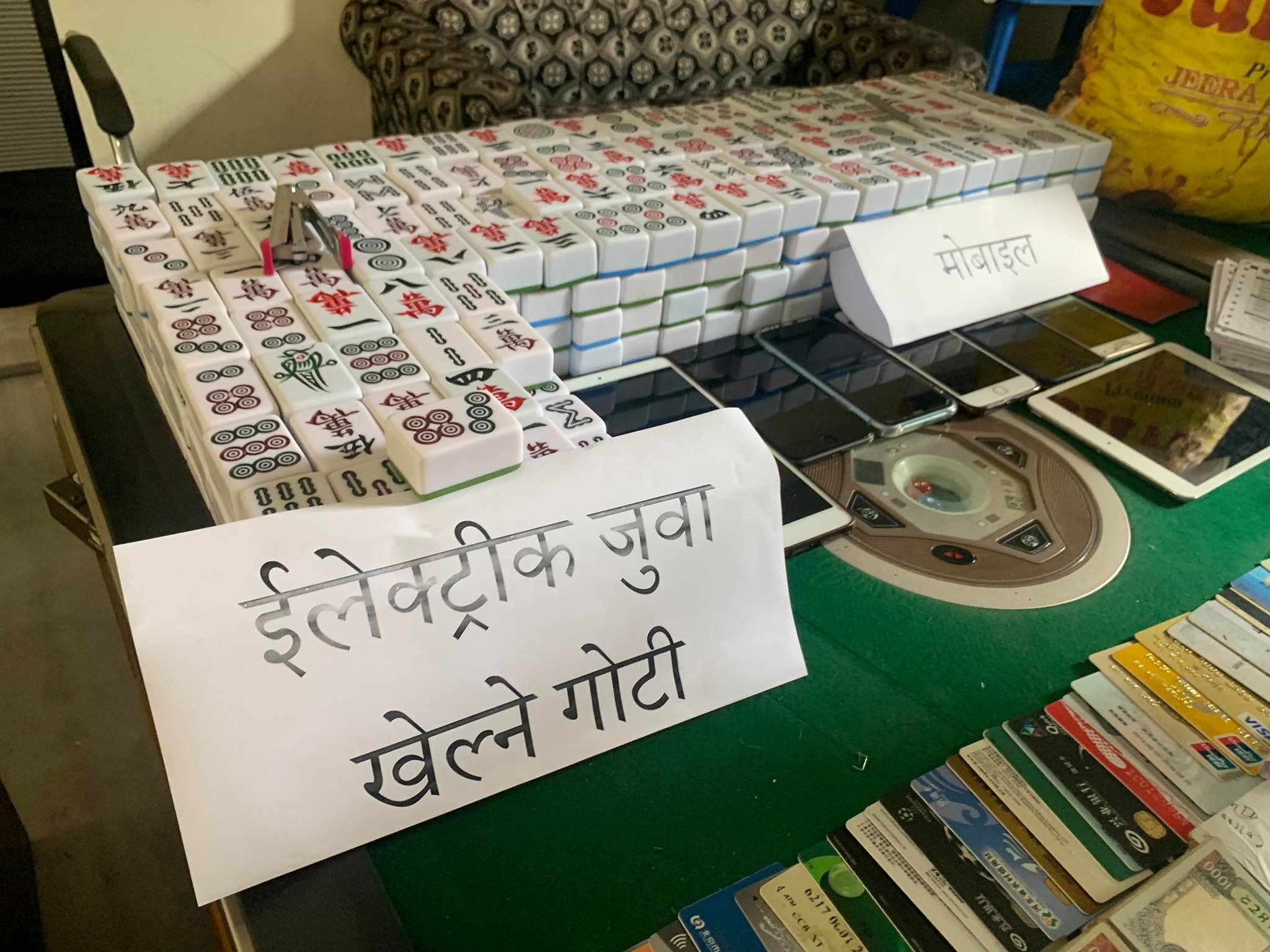KATHMANDU: A couple of days ago, police received information that some Chinese nationals were carrying out suspicious activities at a hotel in Jyatha, Kathmandu.
Based on the information, a team from Kathmandu Metropolitan Police Circle and Metropolitan Police Circle Lainchaur reached the Changkhu Khachan Hotel in Jyatha around 10:30 pm on Monday.
Kathmandu Metropolitan Police Chief SSP Ashok Singh said four Chinese nationals were found in a room on the hotel’s second floor during a raid.
Police interrogated them and searched the hotel room. SSP Singh said, “Since they acted suspiciously, we started searching the room to find two electronic tables used for gambling. In fact, they were involved in illegal gambling by operating a mini-casino inside the hotel.”
According to SSP Singh, even though the game was being played in the form of a casino with pieces called “majung” in Chinese, no gamblers were around. Police, therefore, arrested four Chinese nationals for their alleged involvement in gambling.
Traders and pedestrians at the Thamel area had then retaliated against the Chinese assaulters and saved the severely injured taxi driver.
Among the arrested are Zhou Penucheng, 31, of Yunnan Province with passport number EN 6312742, Jingwin, 34, of Hubei Province with passport number E92104810, Niu Yuliang, 31, of Henan Province with passport number EJI 236063, and Guangdong No. 3 of Zhuangdong Province No. 3.
The carrier is 28-year-old Peng Hui. The police then initiated a search inside the hotel. Besides gambling paraphernalia, police also recovered tiger skin, tiger teeth, musk, Buddhachitta, Rudraksha, cinnamon, and silajit.
SSP Singh said, “We were taken aback to find wildlife parts and herbs during the raid that we conducted on the basis of information that a gambling den was being operated in the hotel.”
He said that police have expanded the scope of the investigation adding that they found the Chinese nationals were found to be operating an illegal business.
Police, however, could not arrest the operator of the hotel. During the search operation, police recovered 35 ATM cards of different banks, bank vouchers and bills and NRs 800,000 from the hotel room.
SSP Singh said, “We have widened the investigation with the suspicion that some others could have been involved in the criminal activities.”
This incident is the latest example of criminal activity committed by Chinese citizens in Nepal.
According to the police, Chinese nationals have been involved in gold smuggling, bank hacking, wildlife smuggling, theft and scuffles.
Involvement of Chinese nationals in ATM hacking
Wang Xiaolong, a 29-year-old Chinese national, was arrested by the police on the evening of April 3 (Chaitra 17) while trying to hack the ATM of Mega Bank in Jyatha, Kathmandu.
Acting on a tipoff, the police team arrested him. Police recovered 10 ATM cards, a passport, an internet connector, a pen drive, a hidden camera, a drill machine, Chinese yuan, US dollars and Nepali rupees from him.
He tried to hack the ATM booth a few hours later of landing at the Tribhuvan International Airport from China. He, however, could not succeed in his mission.
Likewise, police received information that some unusual withdrawals were made from the ATM booths of some banks in Kathmandu on August 31, 2018, similar to the incident of Mega Bank.
Police arrested five Chinese nationals on the same evening for hacking the ATM and stealing money.
Police also arrested another Chinese national the next day. Some Nepalis were also arrested on charges of aiding and abetting the incident.
The mastermind who hacked the ATM PIN and withdrew money was a Chinese national.
Police had arrested as many as 122 Chinese nationals from various places in Kathmandu on December 23, 2019 on charges of carrying out illegal activities and illegal stay in Nepal.
A joint team from the Central Investigation Bureau of Nepal Police, the Metropolitan Crime Branch and the Kathmandu Metropolitan Police Circle, under the direct supervision of Wang Wang Ho, Director of the Ministry of Public Security of China, had raided nine houses in Balaju, Maharajgunj, and Budhanilkantha and arrested them.
Prior to this, police had arrested some Chinese nationals for the involvement in hacking ATMs from Durbar Marg, Thamel, Lazimpat, and other areas.
Chinese citizens involved in various crimes
Li Wiping and Li Jiangjing, Chinese nationals, were abducted on January 3, 2021, from a hotel in Gaushala, Kathmandu.
Police rescued two abducted persons from Marming in Sindhupalchowk district and arrested four others involved in the incident.
Among the arrested were two Nepalis and two Chinese nationals. Later, a police investigation revealed that they were abducted at the behest of a Chinese national.
These are some of the representative cases of Chinese national’s illegal activities in Nepal in the last one year. According to the police headquarters, more than 100 Chinese nationals have been arrested in the past five years in connection with various illegal activities in Nepal.
Likewise, on March 13 last year, a group of Chinese people armed with swords and homemade weapons abruptly attacked a Nepali taxi driver in Jyatha of Thamel.
Traders and pedestrians at the Thamel area had then retaliated against the Chinese assaulters and saved the severely injured taxi driver.
Police had then arrested Wang Yunfeng, a Chinese businessman who led the mob but released him immediately.
In one of the biggest operations against Chinese nationals in Kathmandu, police raided various places in Kathmandu and arrested as many as 122 Chinese nationals who were residing illegally in Kathmandu and were involved in financial crimes in December last year.

This was the largest police operation in which so many foreign nationals were arrested.
Meanwhile, police had arrested five Chinese nationals on September 1, 2019, while stealing money by hacking the ATM PIN of a bank. Another Chinese national was arrested the next day.
Meanwhile, police arrested three Chinese nationals along with 8 kg of gold from Tribhuvan International Airport (TIA) on November 28, 2019.
Likewise, on 5 August 2019, police had arrested a Chinese national, Li Ning, coming from Hong Kong at the TIA with four kilograms of gold.
Similarly, two Chinese nationals were arrested for “stealing” while they were on board a Turkish Airlines flight to Istanbul on August 25, 2019.
These are some of the representative cases of Chinese national’s illegal activities in Nepal in the last one year. According to the police headquarters, more than 100 Chinese nationals have been arrested in the past five years in connection with various illegal activities in Nepal.
Police said the majority of those arrested were found to be involved in dollar cases and smuggling.
They have also been implicated in their involvement in wildlife parts, herbal smuggling, hacking and illegal medical practices.
Reasons for Chinese nationals’ involvement in criminal activities
The previous government led by the Prime Minister KP Oli had decided to waive visa fees to Chinese tourists. As a result, the number of Chinese tourists visiting Nepal increased drastically.
Even though the police headquarters does not have the exact figures on how many Chinese nationals came to Nepal and were involved in crime, more than 200 Chinese nationals have been arrested in the last five years on charges of involvement in various crimes.
Hemant Malla, former DIG of Nepal Police, says, “As the number of Chinese nationals coming to Nepal began to increase, so did their involvement in criminal activities.”
According to Malla, the problem has been exacerbated by the use of high-tech technology by the Chinese nationals involved in crime, and pressure from the embassy to release the Chinese nationals if they are arrested.
Two Chinese nationals were arrested on August 25, 2019, on charges of theft while traveling on an aircraft.
Likewise, Ming Zhang, a 50-year-old Chinese national who was about to fly to Hong Kong in December 2018, was arrested with about 35,000 US dollars, 327,000 Korean won and 1,085 pounds sterling.
Police had arrested three Chinese nationals with sea horse and tiger skin from Thamel in Kathmandu on August 20, 2018.
Among those arrested was Chen Quang, a Chinese national who runs the Kathmandu One Hotel.
Police recovered 300 grams of the sea horse, 90 grams of Yarsagumba, 330 grams of Sunakhari and 6.5 kg of various herbs from the Chinese nationals.
Apart from this, Chinese nationals have also been involved in smuggling valuable herbs and wildlife found in the Himalayan region.
Even though the police headquarters does not have the exact figures on how many Chinese nationals came to Nepal and were involved in crime, more than 200 Chinese nationals have been arrested in the last five years on charges of involvement in various crimes.
According to Bedanidhi Adhikari, director of the prison management department, there are five Chinese prisoners behind bars in Nepal as of mid-June. Of them, one is in Dilli Bazar Jail and four are in Nakhu Jail.
According to him, they were involved in issues related to foreign exchange, illegal gold trade and extortion.
Chinese involvement in crime: cause and control
According to the police officers involved in the investigation, Chinese nationals have been involved in crime in Nepal since around 2060 BS.
They were initially found smuggling red sandalwood and wildlife parts. According to the statistics, after 2003, the trade of illegal red sandalwood has been flourishing in Nepal.

The red sandalwood brought from India was smuggled to China using the Nepali route. At that time, the involvement of Chinese citizens was also seen along with Nepalis.
Since then, the Chinese have been involved in the illegal trade of dollars and gold. Now they are involved in hacking, human trafficking and even drugs.
Former DIG of Nepal Police, Malla said that the main reason for the involvement of Chinese nationals in crimes in Nepal is that it is easier to commit crimes here than in China due to being a neighboring country and due to technology.
Malla says, “Chinese citizens, especially in Nepal, seem to be more involved in wildlife crime and technology crime.”
According to Malla, China is the largest market for wildlife parts. He says, “The Chinese have made Nepal a route to smuggle wildlife parts from India. They also have the involvement of Nepali smugglers. On the other hand, they are far ahead of us in technology, so their involvement in crime using technology is even more visible.”
He also said that investment in technology and skilled manpower should be increased to control crime committed by Chinese citizens.
The former DIG said that in order to control the crimes committed by Chinese nationals entering Nepal, the mechanism for monitoring their activities should be strengthened and coordination between immigration, police, and other concerned authorities.
He says, “Nepal is not able to invest in technology, which is a weakness. This needs to be improved. In addition, the police should be made resourceful, technological and friendly. In other words, the manpower of the police should be prepared accordingly.”
Former DIG of Nepal Police, Keshav Adhikari, says that the surveillance system of Chinese nationals should be expanded from the time they come to Nepal.
“Previously, our airport did not have a biometric facility that keeps track of passengers upon entry,” the official said. Now I have heard that the system has started. However, it is not so effective because of which the record of which Chinese nationals enter Nepal on which visas do not seem to be up-to-date.”
He says, “The reason why so many Chinese nationals have come to Nepal and become involved in crime is that our monitoring process is weak.”
The former DIG said that in order to control the crimes committed by Chinese nationals entering Nepal, the mechanism for monitoring their activities should be strengthened and coordination between immigration, police, and other concerned authorities.
According to police spokesperson Basanta Bahadur Kunwar, no one is allowed to commit a crime – be it a Chinese citizen, a Nepali national or a foreigner.
Also read,
Five Chinese gamblers arrested from Thamel
Chinese criminal gang involved in wildlife smuggling and gambling lands in police net (with video)
Illegal activities of Chinese nationals on the rise in Nepal
Threat posed by Chinese nationals looms over Nepal’s financial sector
Road expansion project: Atrocities of Chinese contractors on Nepali workers









Comment